Founded on the 1st of October 1845 with three boarders and nine day pupils, the College moved, in 1969, from its original premises on St Stephen’s Green, in Dublin’s city centre, to the new campus, to Ballinteer, with 550 pupils. Today there are 950 students attending the college. The college should have celebrated its 175th anniversary last year but, with the Covid-19 lockdown, those celebrations had to be postponed.
Wesley College is a day and boarding secondary school, for both boys and girls, that is nestled between the foothills of the Dublin mountains and suburban Dublin. Sport is an important activity within the school. I arrived at Wesley College to meet the head groundsman, Sam Kingston, on an October day. The trees were showing their wonderful autumn colour, yet, despite this, the daytime temperature was at odds with the time of year. It was close to 20C, feeling more like a July day.
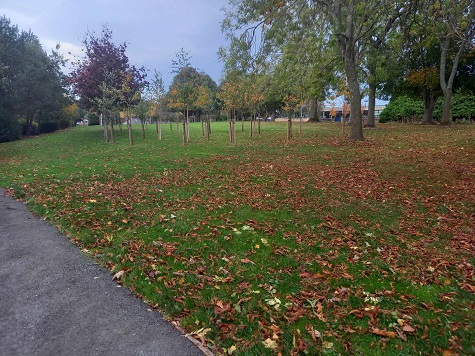
The trees are starting to show their Autumn colours
Most of Sam’s background has been on golf course maintenance. He spent nineteen years as head greenkeeper at Kilcock Golf Club in County Kildare. In late 2019 he became head groundsman at Wesley College. This must have been a big change to his normal daily working routine of maintaining golf greens. “It was a big change sure enough but the basic principals of turf maintenance remain the same. You still need to keep the turf well aerated, and fed. It was the synthetic surfaces that I had to learn a lot about but I read articles and did a lot of research on how to look after these surfaces” said Sam. “Maintaining turf and synthetic pitches is as intense as maintaining a golf course” he continued.
Sam has another person working with him. His name is Kevin Geraghty and he assists him with the day to day operations around the college. It is hoped that a third staff member will be taken on before the end of the year.
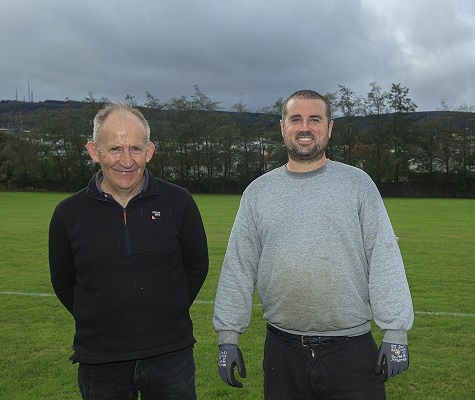
Head groundsman Sam Kingston (left) with his assistant Kevin Geraghty
The timing of Sam’s appointment was, in a strange way, very fortunate. He took on the role in January 2020. Two months later, in March, the country was forced into lockdown, forcing the college to close for the rest of the academic year. This meant that there were no students on the premises for most of 2020, which also meant that no matches took place on the pitches and courts. It provided an ideal opportunity for Sam to learn more about maintaining the artificial surfaced pitches without having the pressure of preparing for important match fixtures. When college life resumed a year later Sam was well prepared for normal sporting activities.
The college covers an area of 50 acres, most of which is taken up with impressive sports facilities. Rugby International and British & Irish Lions player, Eric Miller, is a past pupil of Wesley College. Even though rugby is the main sport played at Wesley, other sports are catered for as well. Facilities include:
- 4 rugby pitches
- 2 soccer pitches – one grass surface pitch and one synthetic surface pitch
- 1 water based synthetic hockey pitch
- 1 astro turf hockey pitch
- 1 cricket pitch
- 2 synthetic tennis courts
The larger synthetic turf surface is marked out for tennis courts during the summer while a 400 metre six lane athletic running track is marked out around one of the rugby pitches during the summer as well.
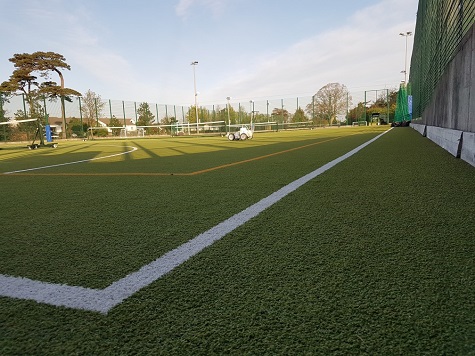
One of the synthetic surfaces being marked out for tennis courts
Maintenance of the water based synthetic hockey pitch is different than the other synthetic pitches. One key difference is that the pitch needs to be wet before any match or training can be played on it. To facilitate this means that an irrigation system had to be installed during the construction of the pitch. There are six sprinkler heads placed around the pitch. These are turned on for two minutes per sprinkler, an hour before the pitch is used. The reason for the pitch to be wet is to stop any injury to players when they fall or slide on the artificial surface.
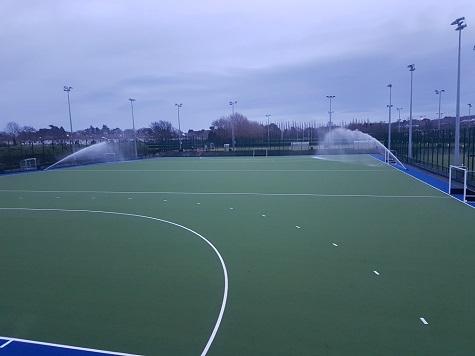
Sprinklers in operation on the water based synthetic hockey pitch
Another maintenance difference is that, each month, the water based pitch needs to be mechanically brushed to remove debris. This is a specialised operation that is given to a turf maintenance contractor to carry out. The brush is located in front of the tractor while the gathered debris is deposited in a collector behind the tractor, all done in one action. Both synthetic pitch types are drag brushed in house by Sam and Kevin every week so as to keep the fibres open. Twice a year an algaecide is applied to the water based synthetic pitch as a preventative measure against moss and algae build up.
The pitches are not only used for the college students. They are also hired out to local clubs in the evenings. Even though the cricket square is surrounded by residential houses, it is not a major concern as it is mostly used by students from the college and for social cricket, mainly consisting of retired people, so long and high balls from batting is never an issue.
The sward on the natural turf pitches is mainly dwarf perennial ryegrass. The soil is heavy underneath so they need constant aeration and sand topdressing. These pitches are given a granular fertiliser in Spring, Summer and Autumn. The Autumn/Winter fertility application program is little and often, with an emphasis on the K and Mg content to help recovery from the Autumn/Winter play.
The cricket outfield is only given fertiliser in Spring and Autumn. The cricket square receives a more structured approach to fertility with applications suited to the time of year. One point which Sam has found interesting is the recommendation to maintain moisture levels on the cricket square at 30% throughout the playing season.
Each week the worn areas on the pitches are topdressed and seeded with a 100% perennial ryegrass mix so as to help recovery. Getting the grass to form deep roots is important, especially in dry conditions as there is no irrigation on these pitches.
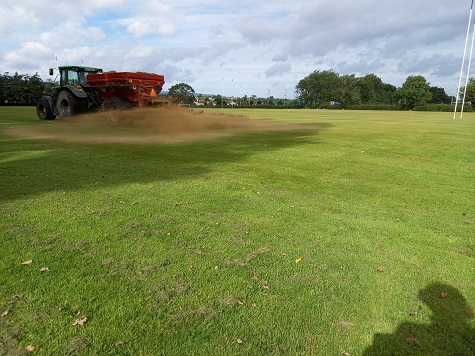
Sam is in constant communication with the school’s different sports coaches. With so many school teams to cater for he needs to know when matches are scheduled, especially for inter school games.
The hedgerows surrounding the college also need to be maintained. Because of the laws surrounding wildlife, the hedges can only be cut at a certain time of year to allow birds nest and rear their young. This is done from September. The trees within the college must be inspected annually for dangerous branches on trees. A tree surgeon is brought in to check for this. With so many students around, their safety is important so weak trees must be dealt with.
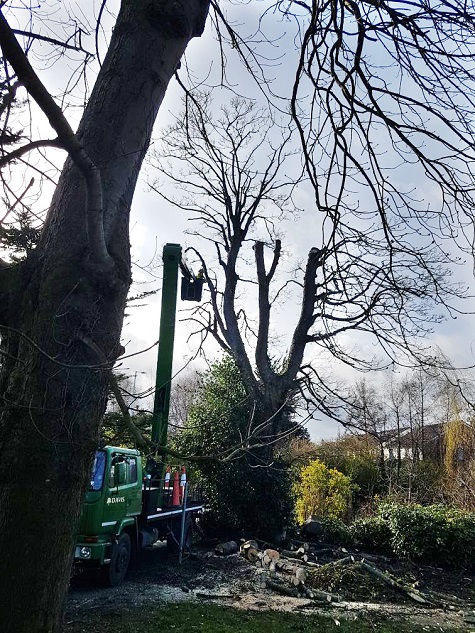
Tree surgery being carried out
There is a lot of wildlife within the college. Grey squirrels, foxes and badgers are often seen roaming the grounds. In the college principal’s residential area, a number of beehives were introduced to show the students the importance of pollinators in the environment.
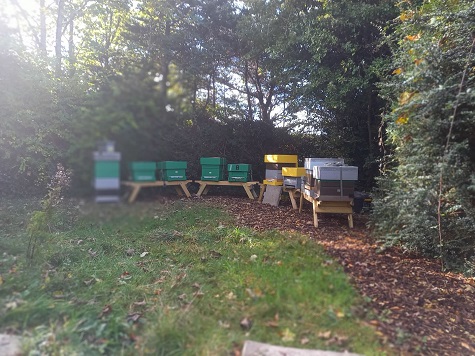
Beehives were introduced to the college
I was very impressed with what Sam and Kevin had achieved in a short space of time. For Sam, with many years of greenkeeping experience behind him, it was a natural progression to move to Wesley College but he has also embraced the newer challenges associated with looking after the sporting needs of 950 students and their coaches.